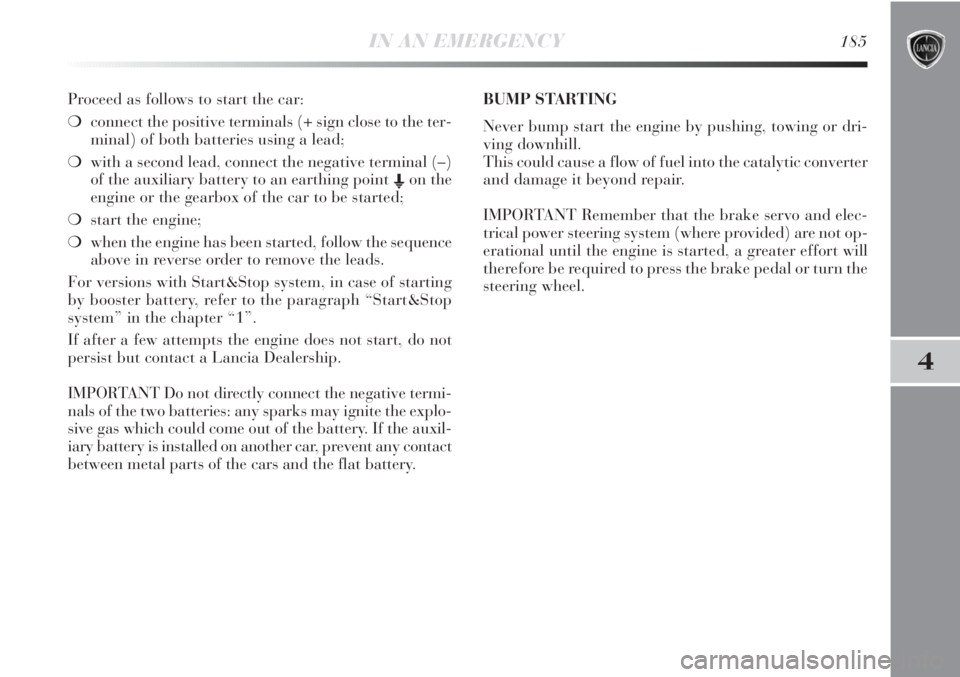Page 122 of 290
1
KNOWING YOUR CAR121
EMERGENCY STARTING
When jump starting, never connect the negative lead (−)
of the auxiliary battery to the negative pole A-fig. 77
of the car battery, but rather to an engine/gearbox earth
point.
fig. 77L0E0190mfig. 78L0E0195m
Before opening the bonnet, make sure the
engine is off and the ignition key is in the
STOP position. Follow the instructions on the ded-
icated label on the front crossmember (fig. 78).
It is advisable to extract the key when there are
other people in the vehicle. Exit from the vehicle
only after having removed the ignition key or hav-
ing rotated it to the STOP position. During refu-
elling, make sure the vehicle has been stopped and
the key is in STOP position.
Page 185 of 290
184IN AN EMERGENCY
ENGINE STARTING
Go to a Lancia Dealership immediately if instrument
panel warning light
Yremains on constantly.
JUMP STARTING fig. 1
If the battery is flat, the engine may be started using an
auxiliary battery with the same capacity or a little higher
than the flat one.
fig. 1L0E0074m
Strictly avoid using a rapid battery charger
for jump starting: this could damage the
electronic systems and the engine fuel sup-
ply and ignition control units.
This starting procedure must be carried out
by expert personnel as incorrect manoeu-
vres can cause electrical discharges of con-
siderable intensity. Furthermore, battery fluid is
poisonous and corrosive: avoid contact with your
skin and eyes. Keep naked flames away from the
battery. No smoking. Do not cause sparks.
Page 186 of 290

IN AN EMERGENCY185
4
Proceed as follows to start the car:
❍connect the positive terminals (+ sign close to the ter-
minal) of both batteries using a lead;
❍with a second lead, connect the negative terminal (–)
of the auxiliary battery to an earthing point E
on the
engine or the gearbox of the car to be started;
❍start the engine;
❍when the engine has been started, follow the sequence
above in reverse order to remove the leads.
For versions with Start&Stop system, in case of starting
by booster battery, refer to the paragraph “Start&Stop
system” in the chapter “1”.
If after a few attempts the engine does not start, do not
persist but contact a Lancia Dealership.
IMPORTANT Do not directly connect the negative termi-
nals of the two batteries: any sparks may ignite the explo-
sive gas which could come out of the battery. If the auxil-
iary battery is installed on another car, prevent any contact
between metal parts of the cars and the flat battery.BUMP STARTING
Never bump start the engine by pushing, towing or dri-
ving downhill.
This could cause a flow of fuel into the catalytic converter
and damage it beyond repair.
IMPORTANT Remember that the brake servo and elec-
trical power steering system (where provided) are not op-
erational until the engine is started, a greater effort will
therefore be required to press the brake pedal or turn the
steering wheel.
Page 219 of 290

218IN AN EMERGENCY
38
38
38
38
38
38
38
38
38F43
F44
F46
F47
F48
F49
F51
F52
F5330
15
20
20
20
5
5/7.5 (*)
15
7.5
USERS FUSE AMPS FIGURE
Windscreen wiper system on steering column stalk,
bi-directional windscreen/rear window washer pump system
on steering column stalk
Cigar lighter/power socket on tunnel,
luggage compartment power socket
Sunroof motor
Driver’s front electric window
Passenger side front electric window
Hazard, right, left and centre control panels on radio/
radio-navigator (lighting), steering wheel controls (lighting)
controls on front roof light (lighting), volumetric alarm control unit,
electric sun roof system (control unit, control lighting),
rain/dusk sensor, electrochromic mirror,
heated front seat controls, AUX socket (lighting)
Cigar lighter (lighting), Cruise Control system control,
Blue&Me™ Node, Parking Sensor Node, AQS sensor,
climate control unit, door mirror adjustment,
tyre pressure monitoring system control unit, lane assistance Node,
controlled damping suspension Node, control unit on right hand gas
discharge headlight (1.4 Turbo Multi Air versions excluded)
voltage stabiliser (1.4 Turbo Multi Air versions) (*)
Rear wiper system on steering column stalk
Instrument panel, rear direction indicators
(*) Version with gas discharge headlamps.
Page 231 of 290
230SERVICING AND MAINTENANCE
Perform the following inspections more frequently than
indicated in the Scheduled Servicing Plan:
❍check front disc brake pad condition and wear;
❍check cleanliness of bonnet and boot locks, as well as
cleanliness and lubrication of linkages;
❍visually inspect the condition of engine, gearbox,
transmission, pipes and hoses (exhaust – fuel supply
– brakes) rubber elements (boots – sleeves – bushes
etc.);❍check battery charge and fluid level (electrolyte); (see
“Battery” in this chapter);
❍visually inspect the condition of auxiliary drive belts;
❍check and, if necessary, replace the pollen filter; in
particular it should be replaced if a decrease in the air
flow into the passenger compartment is detected;
❍check air filter and replace, if required.